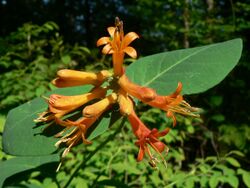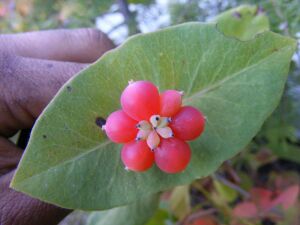Biology:Lonicera ciliosa
| Lonicera ciliosa | |
|---|---|

| |
| Scientific classification | |
| Kingdom: | Plantae |
| Clade: | Tracheophytes |
| Clade: | Angiosperms |
| Clade: | Eudicots |
| Clade: | Asterids |
| Order: | Dipsacales |
| Family: | Caprifoliaceae |
| Genus: | Lonicera |
| Species: | L. ciliosa
|
| Binomial name | |
| Lonicera ciliosa (Pursh) Poir. ex DC.
| |
Lonicera ciliosa, the orange honeysuckle or western trumpet honeysuckle is a honeysuckle native to forests of western North America. A deciduous shrub growing to 6 m (20 ft) tall with hollow twigs, the leaves are opposite, oval, 4–10 cm (1.6–3.9 in) long with the last pair on each twig merged to form a disk. The flowers are orange-yellow, 2–4 cm (0.79–1.57 in) long, with five lobes and trumpet shaped; they are produced in whorls above the disk-leaf on the ends of shoots. The fruit is a translucent orange-red berry less than 1 cm (0.39 in) diameter.[1][2]
Medicinal uses
During Lewis and Clark's expeditions beginning in 1804, Lonicera ciliosa was one of the many florae recorded.[3] The orange honeysuckle was used as cold medicine, a contraceptive, a sedative and even as a tuberculosis remedy.[4]
Edible uses
The fruits are edible[5] either raw or cooked, but are not a common food.[6]
References
| Wikimedia Commons has media related to Lonicera ciliosa. |
- ↑ {{citation | mode = cs1 | title = Lonicera ciliosa | work = Germplasm Resources Information Network (GRIN) | url = | publisher = [[Organization:Agricultural Research ServAgricultural Research Service (ARS), United States Department of Agriculture (USDA) | access-date = 21 January 2018 }}
- ↑ U. of Washington Burke Museum: Lonicera ciliosa
- ↑ "June 5, 1806" (in en). https://lewis-clark.org/day-by-day/5-jun-1806/.
- ↑ Heaton, Darrall; DerMarderosian, Ara (2004). "An Ethnobotanical and Medical Research Literature Update on the Plant Species Collected in the Lewis and Clark Expedition of 1803-1806". Bartonia (62): 63–93. ISSN 0198-7356. https://www.jstor.org/stable/41610108.
- ↑ Fagan, Damian (2019). Wildflowers of Oregon: A Field Guide to Over 400 Wildflowers, Trees, and Shrubs of the Coast, Cascades, and High Desert. Guilford, CT: FalconGuides. pp. 227. ISBN 1-4930-3633-5. OCLC 1073035766. https://www.worldcat.org/oclc/1073035766.
- ↑ Plants For A Future -- Lonicera ciliosa
Wikidata ☰ Q2671010 entry
 |


